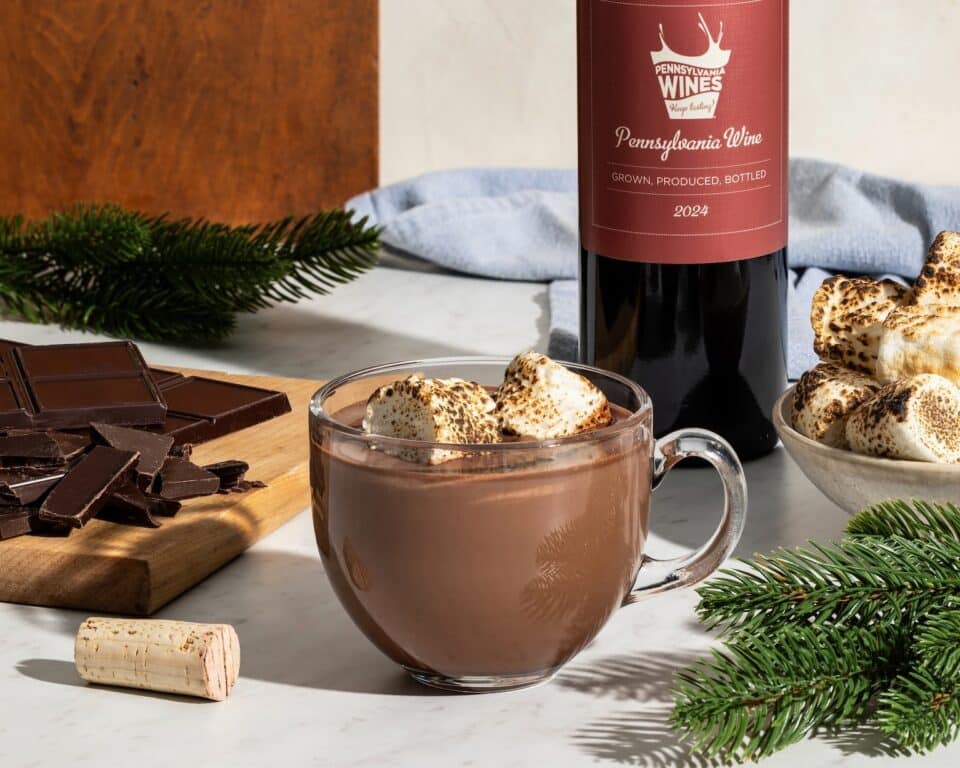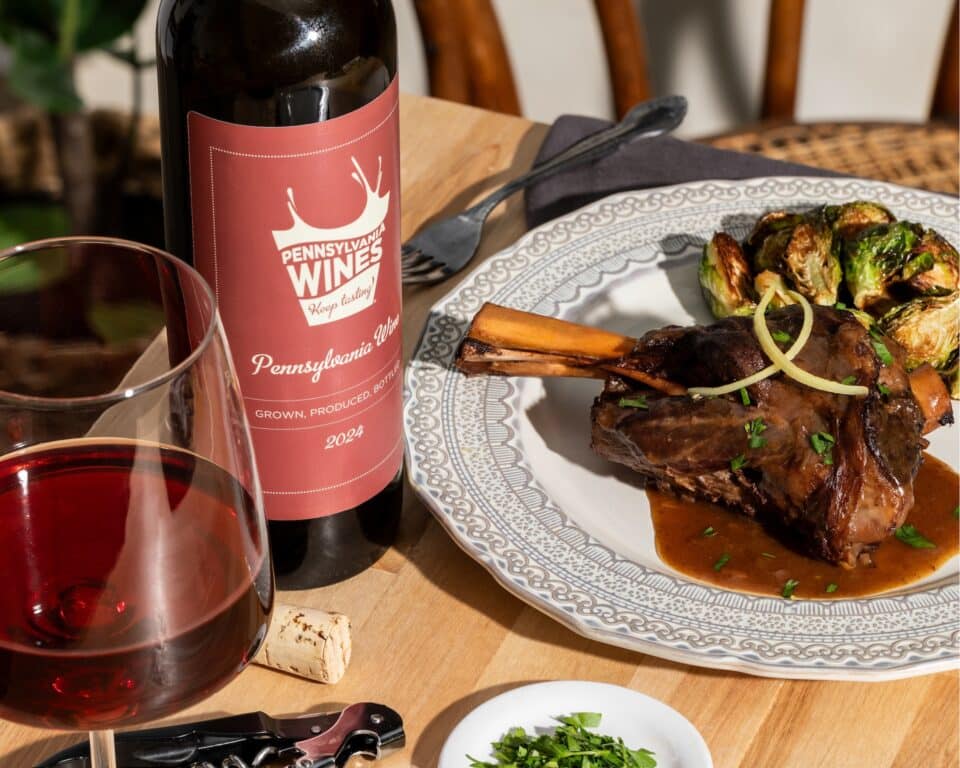As one of the oldest and top-producing wineries in all of Pennsylvania, Nissley Vineyards in Lancaster County has carved its place as an industry leader in the state and beyond. Currently run by its third-generation, Jonas Nissley, the winery offers over 30 wines in a breadth of flavors and character. Visitors can also enjoy vineyard events carried on since the winery’s beginnings, which Nissley has helped to evolve.
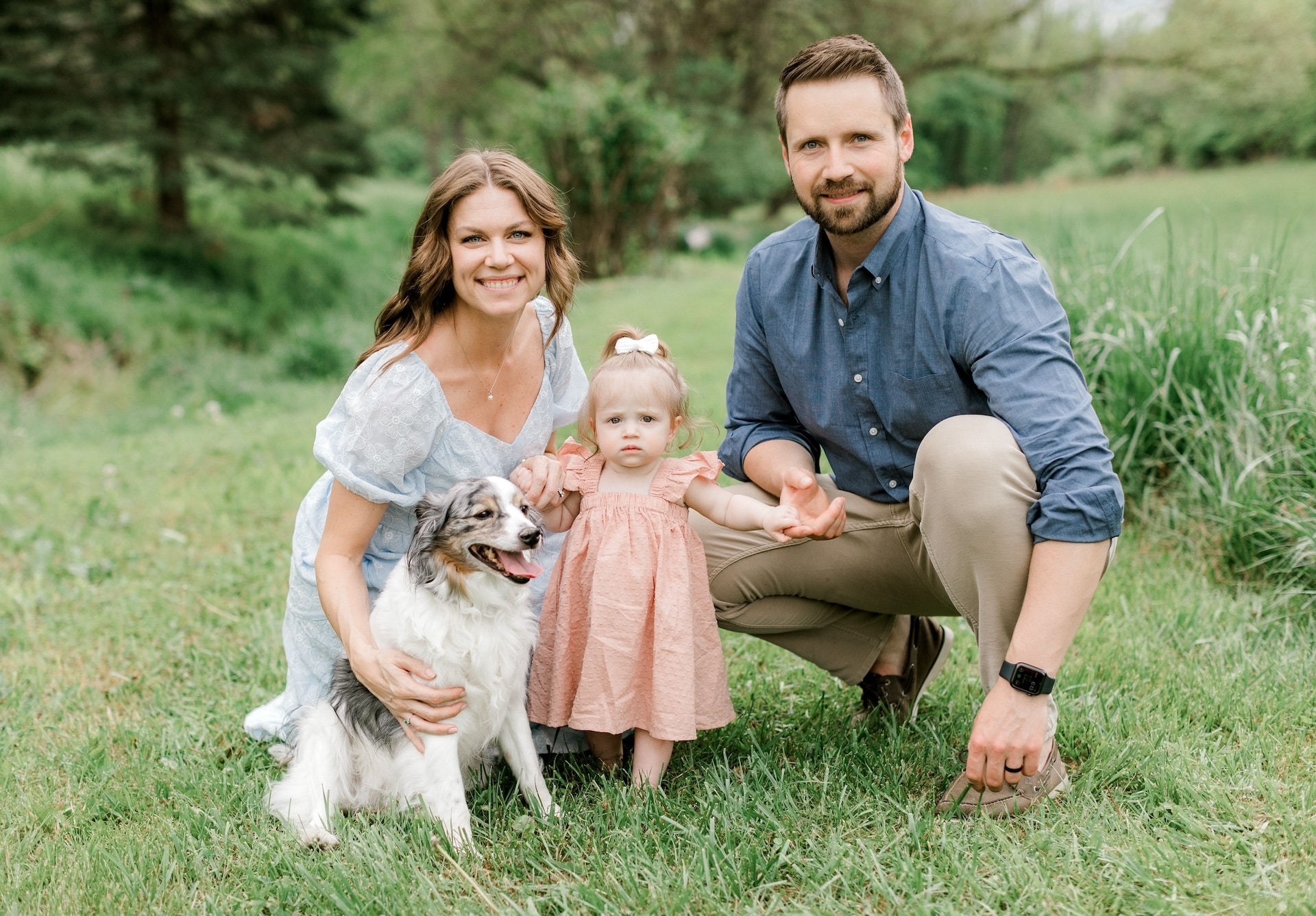
Alyssa, Sawyer and Jonas Nissley
We spoke with Jonas Nissley about the history, portfolio and vision of Nissley Vineyards.
PA Eats: Can you tell us about the early days of Nissley Vineyards and what that looked like?
Jonas Nissley: My grandpa was a bridge builder and pretty successful in his career. His kids were not interested in the bridge business, however. He’d purchased a lot of farmland in Bainbridge, where we are now, and he wanted to do something with the land. He had produced wine at home, in his basement for a while and, when he became aware of the Limited Winery Act, it spurred his interest in producing commercially.
In 1975, he and my dad planted about three to four acres of grapes. No one knew what to expect. No one was growing grapes around here. The grapes actually thrived. Then, my aunts got involved in the business. My aunts focused on events and the upkeep of the property. So, it was definitely a family business from the beginning.
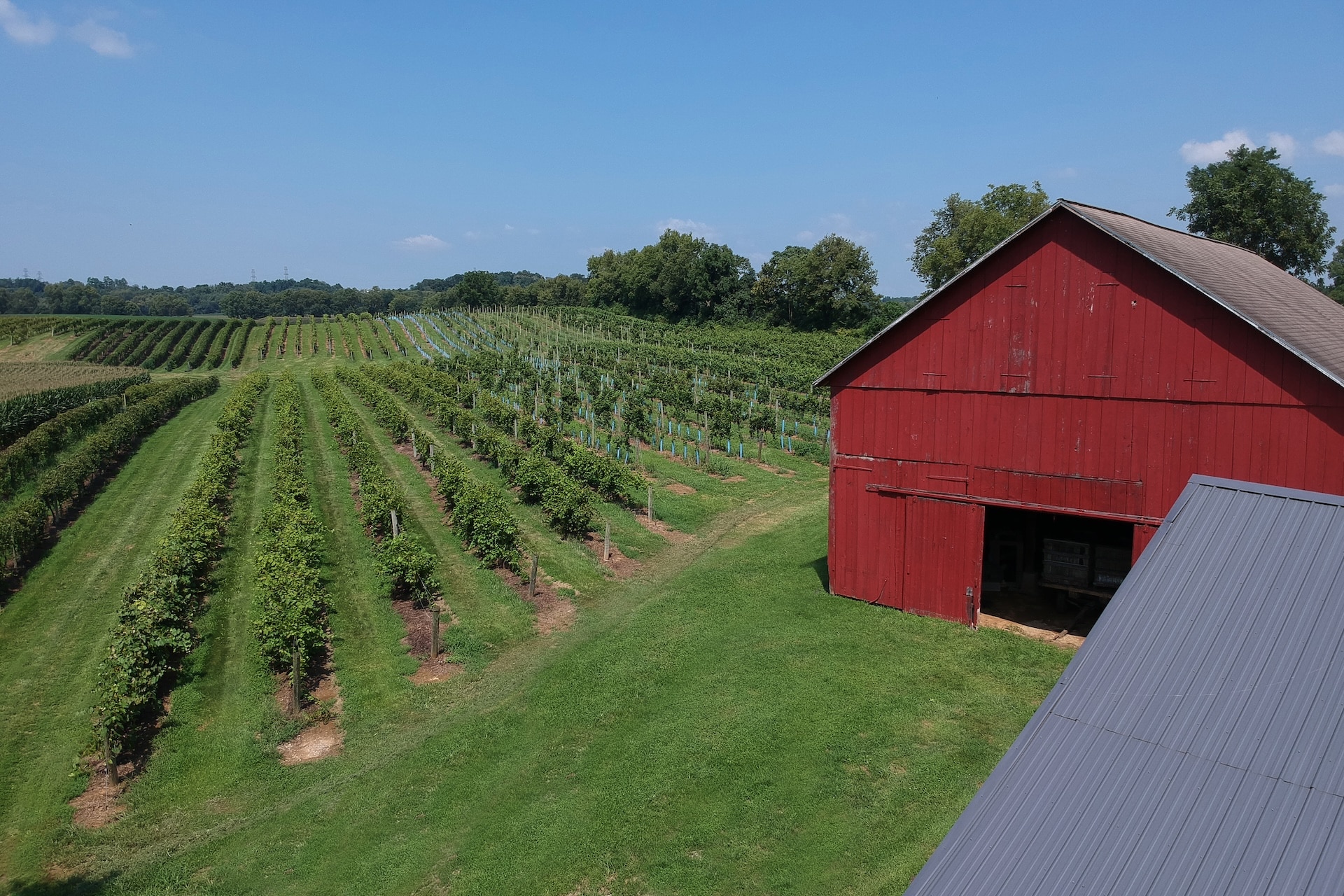
Your grandfather, Dick Nissley, helped found the PA Wine Association. What was his vision?
He was one of the founding members and the first president of the Pennsylvania Wine Association. There was a strong industry coalition in the bridge building and general contracting world and he understood that, for the wine industry to be successful, it had to be a collaborative effort.
At the time, it was sort of the wild west. Pennsylvania was uncharted territory. They were doing good things [with wine] in California and New York, but it was all very new here. There were not many people doing it. They wanted to put their knowledge together to make good wines in Pennsylvania.
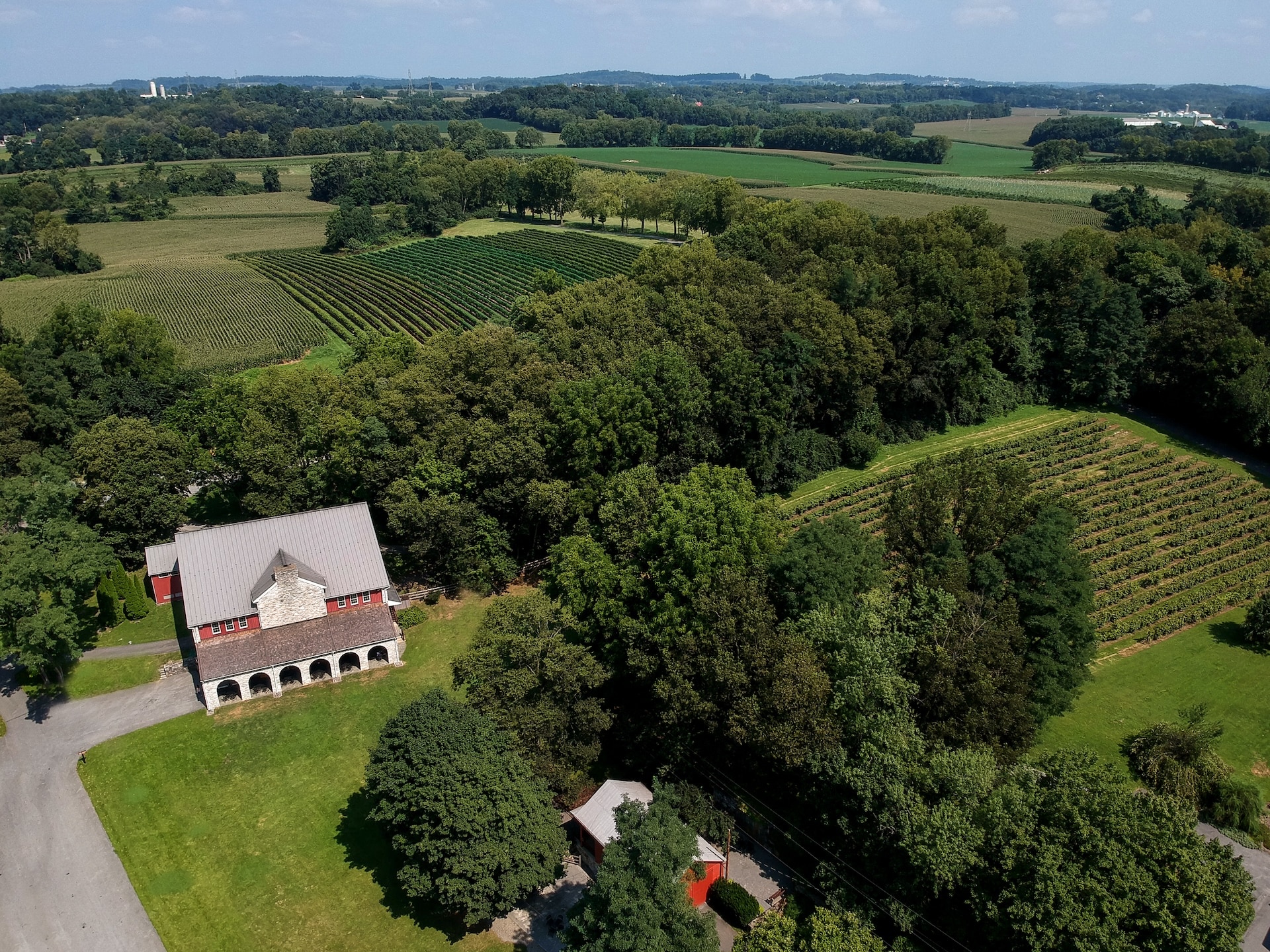
Can you tell us about the scope of the business and the vineyards?
We have about 37 acres of vines, which doesn’t account for entire production, but all of our grapes are grown in Pennsylvania. We’re very committed to that because we need to rely on the products produced here if we’re going to build the reputation of Pennsylvania wine. It’s one of our goals.
We’re continuing to plant acreage. We’ve been planting and renewing old vineyards for about seven or eight years, and we’re continuing on that path. We’re certainly committed to producing many if not all our wines as estate wines. Some are harder than others. But, we’re certainly focused on producing the vinifera with our vineyard because we can do that really well.
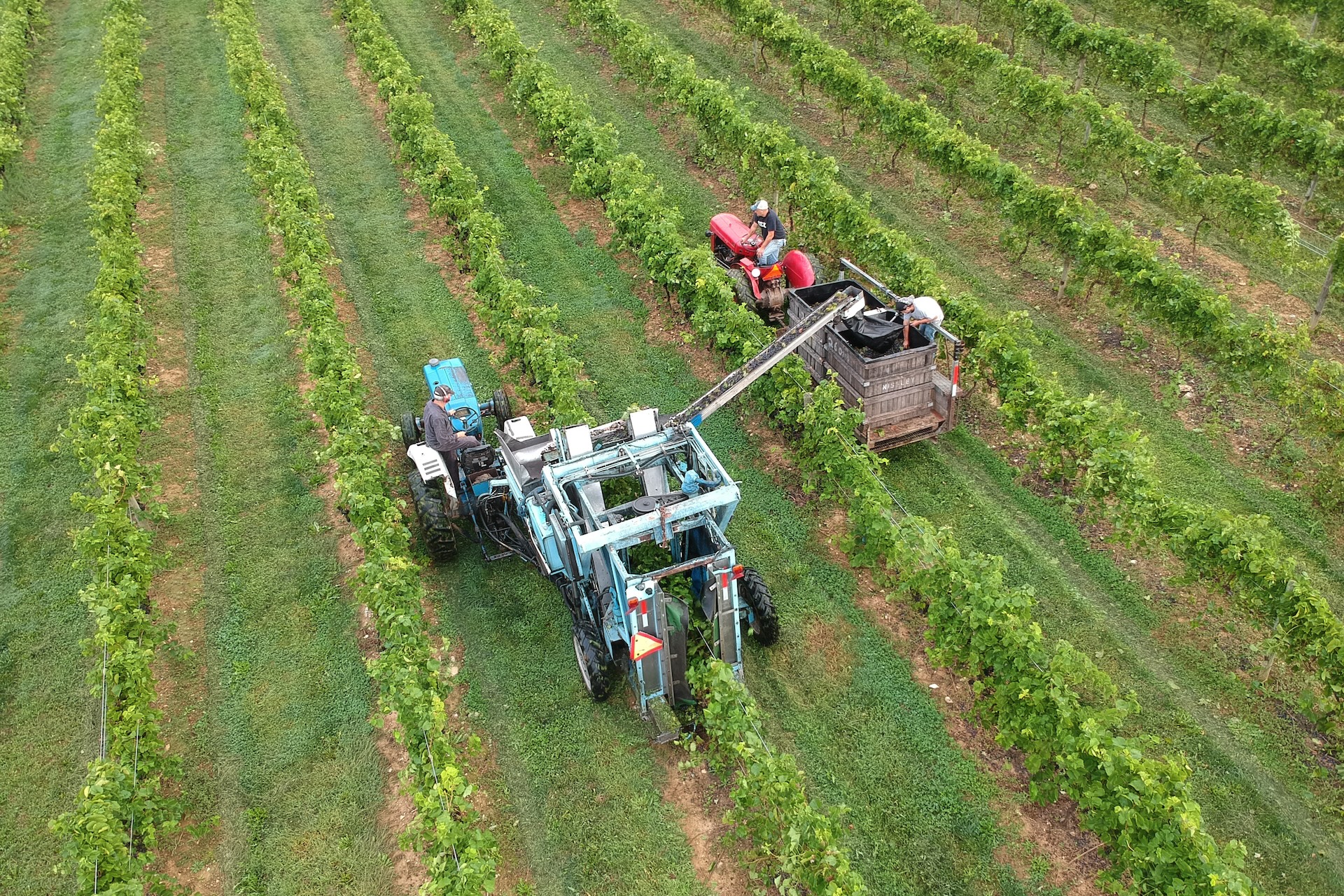
We have three winemakers, led by Brittany Vittor. She’s been with us for about 15 years. She started in the retail location and did that for a while. One year, we were short on hands for the bottling line and I knew that she was a really hard worker. We had her come up for the day on the bottling line. She did a really great job and we asked her a few more times and she continued. The circumstances aligned when we needed another full-time person in the winery. We said, ‘Why don’t we see if Brittany might like the cellar job?’ She accepted it and served in that role for a few years as kind of an assistant to the winemaker. Then, the winemaker role became open in 2022. We hired a consulting winemaker and Brittany trained under her until about 2023. She got enough experience under her belt and she took the reins. She’s really done a great job and has risen through the ranks, so to speak, to one of the most important jobs in the company.
How do you strike a balance with such a wide-spanning portfolio that includes 32 wines with sweet, sparkling fruit wines on one end, and nuanced, dry, red heritage wines on the other?
We want to have a wine for everyone who walks through the door. We want everyone to find something for them, and that’s why we have such a wide wine list. There’s a lot of thought and intentionality in what those wines are. We try to fill all the gaps from dry, elegant nuanced wines to very sweet. The palette of the Pennsylvania consumer is so varied. You have people who can appreciate all types of wines. I’m always surprised when customers who might like our sweetest wine also love our driest. So, we really want to approach our wine list with the consumer in mind.
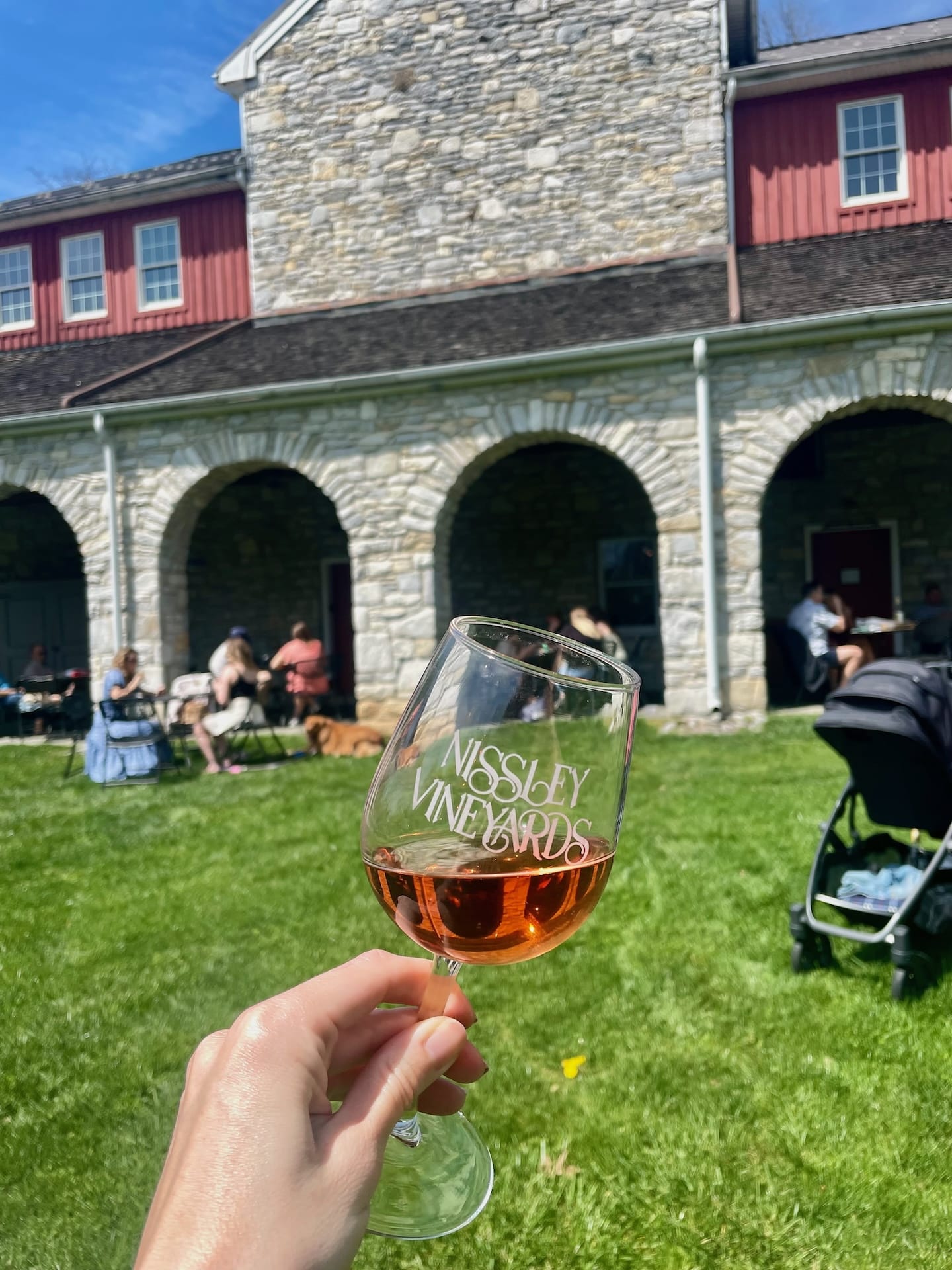
We also approach the production of sweet wines with the same rigor that we produce dry wines. We don’t consider them “less than” anything else. If they happen to be sweet, it doesn’t mean they deserve less attention or care, and I think that sets us apart from others. I think that’s why we’re successful, especially with sweet wines, we put attention on producing the best, whether sweet or dry.
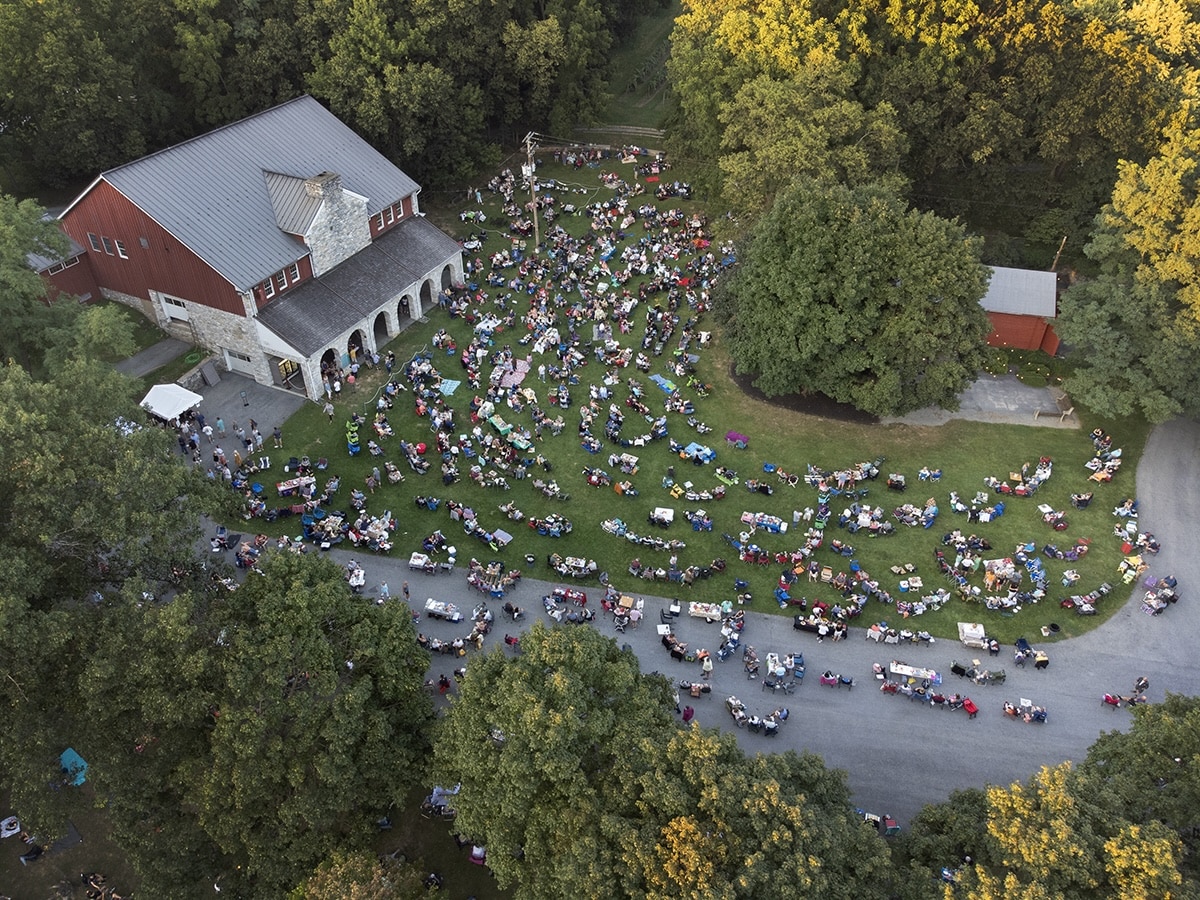
Nissley is known for its events, with a lot going on at all times. Why is that important to Nissley, and how do you see that evolving?
We see that when we pair our great wines with a great experience, those are often the most meaningful types of things we can put forward for guests to enjoy. It’s not just a great product or great event; it’s both. They feed off each other.
This is our 42nd season of the concert series, Summerfest. Every Friday and Saturday night, we have bands outside, food trucks, slushies, and dancing on the lawn. We have a beautiful space for it. When you put all those things together, it creates a really unique experience.
We are an outdoor venue. In some ways it can be a challenge, but in some ways gives us lots of flexibility. We can host a lot of people. The concert series is a big part of our identity and growth, and we’ve also added more series and events, like spring and fall fasts, which are single day events.
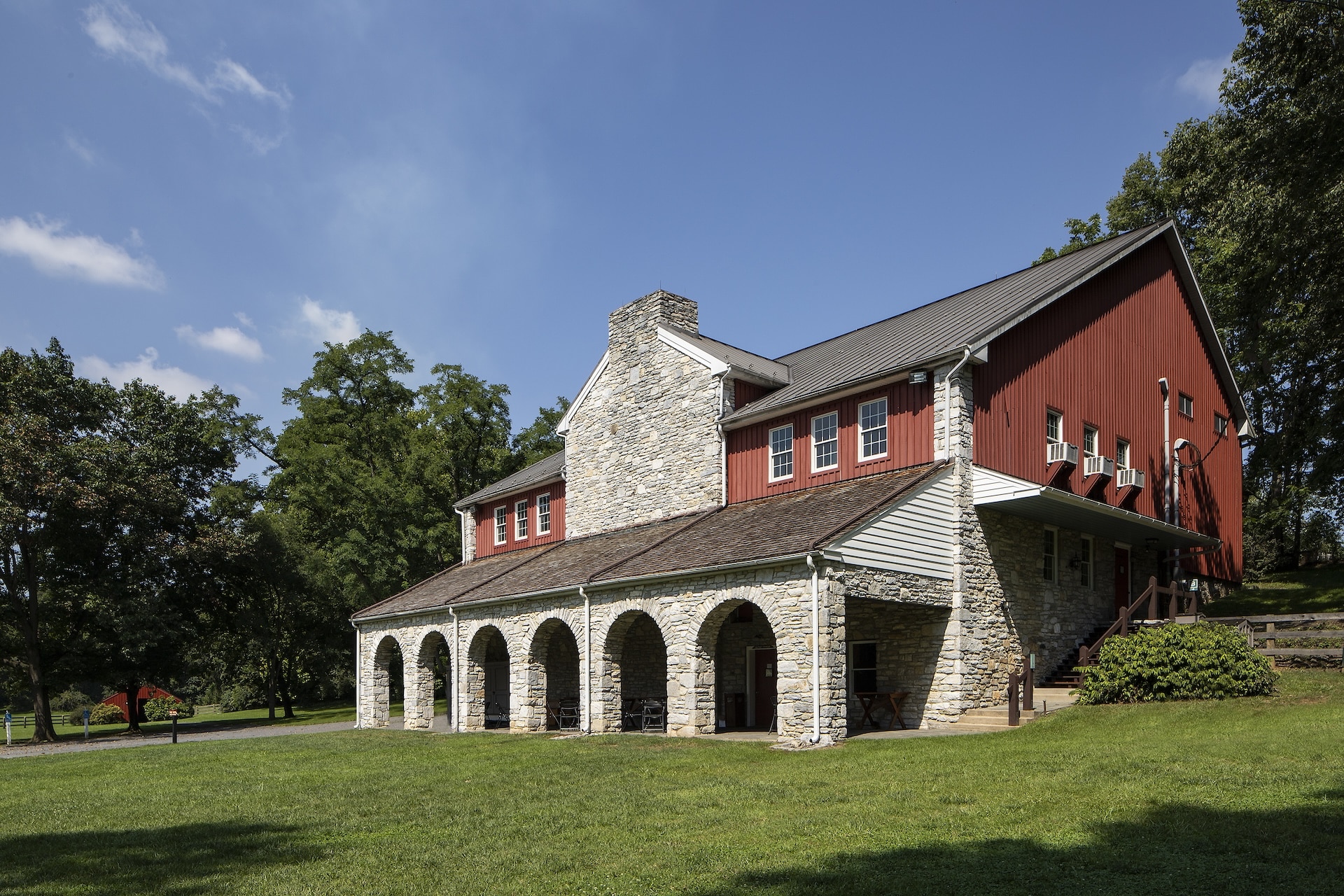
Can you tell us about Nissley’s different wines?
Our most recent release was our Heritage series and that was really a focus on the top tier, best dry wines that we can produce here at Nissley and in Pennsylvania. It’s Chardonnay, Chambourcin, Cabernet Franc, and the Keystone, a Bordeaux blend. Those are almost exclusively estate wines and really a focus on the absolute best that we can do. They are priced from $30 up to $48, so they’re in a higher bracket. We’ve found that people have responded really well to that, understanding that it’s challenging to grow great grapes in PA. It takes a lot of care. We’re really proud of those wines and the series has fit in well with our expansion of vines on the property. We’re soon to sell out of the Keystone and Cab Franc.

Besides the top-tier line, mid-tier is the Reserve series. That includes a Chardonnay, Merlot, Cabernet Franc and Cabernet Sauvignon. Then there are sweeter wines as well. Our best-selling wine overall is our sweetest wine, the Grapeful Red. It’s super-smooth, super-creamy and grape-y. It’s performed well for us a long time. People who think they don’t like wine like that wine. It’s great to see.
We also have a Seyval Blanc. There are not a ton of those around. It’s from those first vines from 1975, so we have the old vine designation on the label. We feel that’s justified. The age creates an interesting character. It’s like a Sauvignon blanc – it has those grassy grapefruit notes when it’s younger. As it’s aged, it’s gone more towards citrus, lemon and lemon curd and the the mouthfeel has mellowed out. It has a round mouthfeel with great citrus fruit character.
What are you looking forward to offering?
We have certainly done a lot more with wine slushies. It’s amazing. Every year we serve more and more. We craft these slushy products to be really tasty. It’s actually really hard to make a really great wine slushy. It’s not like making a great wine; there’s a different way you have to approach it. Keeping that consistent and making new flavors is a challenge we welcome. We sell so many that it’s becoming an important part of the business.
As for the vineyards, we have plans to continue planting more acreage and moving towards being estate with dry wines, if possible, and then with the sweeter wines. The best results come from us growing the grapes. We’ve seen that for years. But it’s tough when you’re our size. We’re taking little bites as we go.
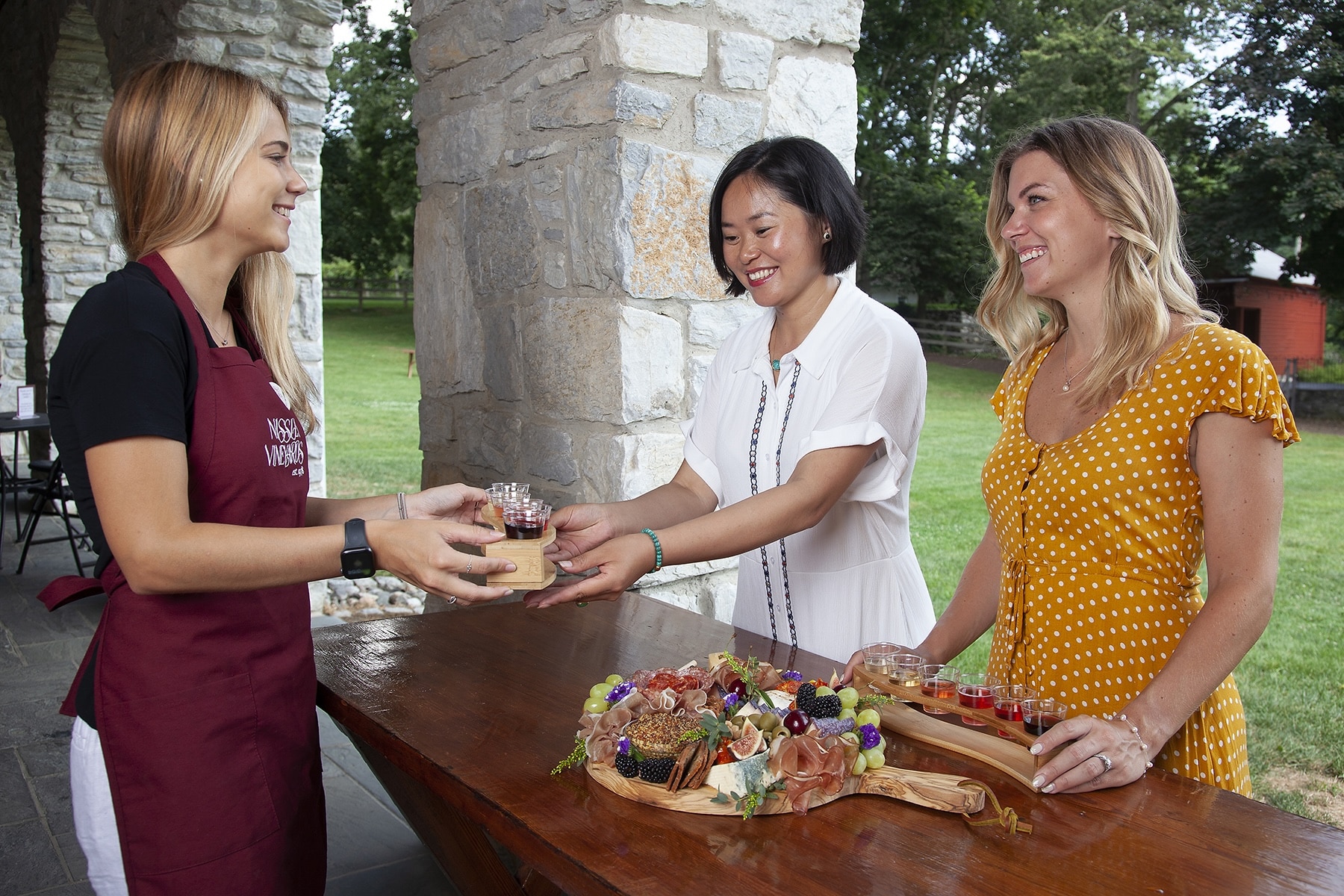
How do you think Nissley fits into the Pennsylvania wine landscape, and how does PA fit into a national or event international scene?
That’s a big question. I think Nissley is certainly a flag bearer, so to speak, because we were one of the first in the state and have grown to be among the largest. I think there’s some responsibility that comes with that. We — us as a business, and the PA wine industry in general — still are fighting against this notion that there aren’t good wines produced in Pennsylvania. I still hear, ‘I didn’t know there were good wines in PA.’ So, we fight this narrative a lot. We talk about this at every industry event: ‘How do we change people’s minds about Pennsylvania wines? Have them taste it.’
We see this in farm to table restaurants. They have all shifted the focus to the local food. You go to the wine list and see local beer and local spirits, but not local wines. You might ask why and the response is, ‘PA doesn’t make good wines.’ What are the ways we can fight this narrative? It’s certainly a struggle, not one that’s fixed overnight. We have to get people tasting our products.
We’re still working towards having a state identity with regard to our viticulture and vinology, and it’s championed by the wineries doing a great job producing great wines. I’d like to count ourselves among that. I think it’s really important that the wineries doing a great job continue to do so, and that the new ones do the same.
The PA Vines & Wines series was created in collaboration with the Pennsylvania Wine Association with Round 8, Act 39 grant funding from the Pennsylvania Liquor Control Board (PLCB).
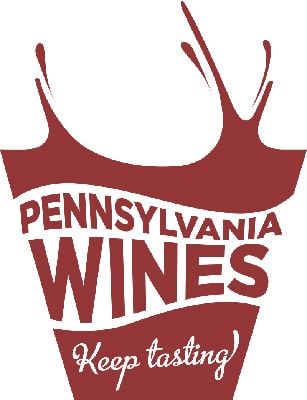
The Pennsylvania Winery Association (PWA) is a trade association that markets and advocates for the limited licensed wineries in Pennsylvania.
- Photos: Nissley Vineyards

